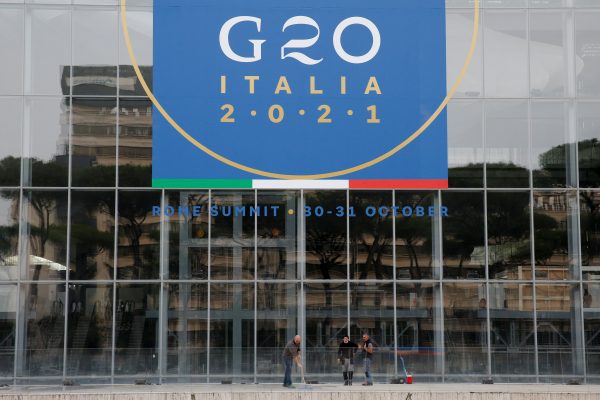But as the G20 leaders prepare to meet in Rome later this week, it is not clear that their agenda still reflects the group’s raison d’être. Despite a COVID-19 vaccination campaign that began nearly a year ago, and pledges to supply billions of vaccine doses to developing countries, the overwhelming majority of the world’s poorest have not yet been inoculated.
Meanwhile, the economic rebound from the world’s worst economic downturn since the Great Depression is weakening. The G20’s agenda focuses more on medium and long-term challenges like international corporate tax reform and climate change than on the short-term economic necessity of securing global economic recovery.
The fortunes of rich and poor countries are diverging. The advanced economies are on track to regain their pre-COVID-19 growth trajectories; the developing economies, by and large, are still languishing. The 2020 downturn was the developed world’s first services-led recession, as lockdowns and social distancing smashed businesses that relied on person-to-person contact. The recovery, by contrast, has largely been led by demand for goods, which has resulted in supply chain problems and higher than average inflation. In the developing world the rebound has been more sluggish. Fiscal tightening has already begun in many emerging markets, even though the damage caused by the pandemic — to peoples’ livelihoods and to businesses’ balance sheets — remains largely unrepaired.
The advantage of the G20 over other international groupings is the breadth of its membership, incorporating the major developing and developed nations. As Adam Triggs argues in our lead article this week, the most pressing issues facing the G20 are ones that spill across national borders.
On one hand, monetary contraction in advanced countries as inflationary pressures emerge may lead to a damaging repeat of the ‘taper tantrum’ of 2013 in emerging markets that could take the wind out of the recovery in the developing world. On the other hand, a failure to channel vaccines to the developing world will drag the health crisis out well beyond 2022, at enormous human and financial cost, and perhaps provide the virus with the chance to mutate into deadlier strains. The case for concerted global action is overwhelming.
What form should global cooperation take? It is clearly necessary to ramp up vaccine distribution. Promises have been made and not kept. Some rich countries do not seem to understand the stake they have in a global response. Australia is, incomprehensibly, winding down production of vaccines even as the virus rampages in its Southeast Asian neighbours. Both on humanitarian and on economic grounds, the G20 must coordinate a more ambitious response to vaccinate those parts of the world that have been left behind.
The economic challenge is less straightforward. At the core of a robust response must be to provide fiscal breathing room for emerging economies that are still struggling. This would require a major upgrade of the G20’s cooperation on debt forgiveness. As Triggs argues, ‘the G20 should support the fiscal space and health spending of developing countries by buttressing their financial stability. It should revise its debt forgiveness program to remove the stigma of access’.
The G20’s capacity to manage these dual crises is hampered by the simmering strategic rivalry between China and the United States. As David Vines argues this week, this competition places considerable roadblocks in the way of cooperation on the urgent policy questions facing G20 leaders, as both superpowers believe they have short-term interests in a weakening of the rules-based order. Vines argues that ‘China is afraid of cooperating with a United States that could produce Donald Trump as leader. And the United States is afraid of cooperating with China because that might erode the case for US exceptionalism’.
Vines urges us to be realistic about what might have been and still could be achieved this year. When it was first launched as a leaders’ forum, some hoped that the G20 would be the forum to devise ‘Bretton Woods II’. The G20 has significant runs on the board, but even its most ardent supporters would concede that many of the major challenges facing the multilateral system still remain on the ‘to do’ list. It’s an agenda that is only becoming more necessary as the willingness of the United States to play by the rules it set more than 70 years ago is fading.
The bad news is that, given its overstuffed agenda, the Rome summit is unlikely to make much headway. The good news is that from next year the G20 will be hosted by three developing economies in succession — Indonesia, India and Brazil. Each has an interest in reinvigorating the multilateral framework on which their future growth depends. Like Rome, a new international economic order cannot be built in a day, or even in a leaders’ summit weekend. Indonesia, as the 2022 host, should waste no time in crafting an ambitious agenda to reignite the multilateralism of which its and all our futures will depend.
The EAF Editorial Board is located in the Crawford School of Public Policy, College of Asia and the Pacific, The Australian National University.

